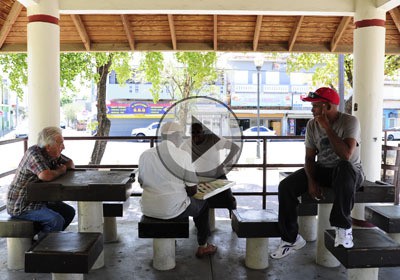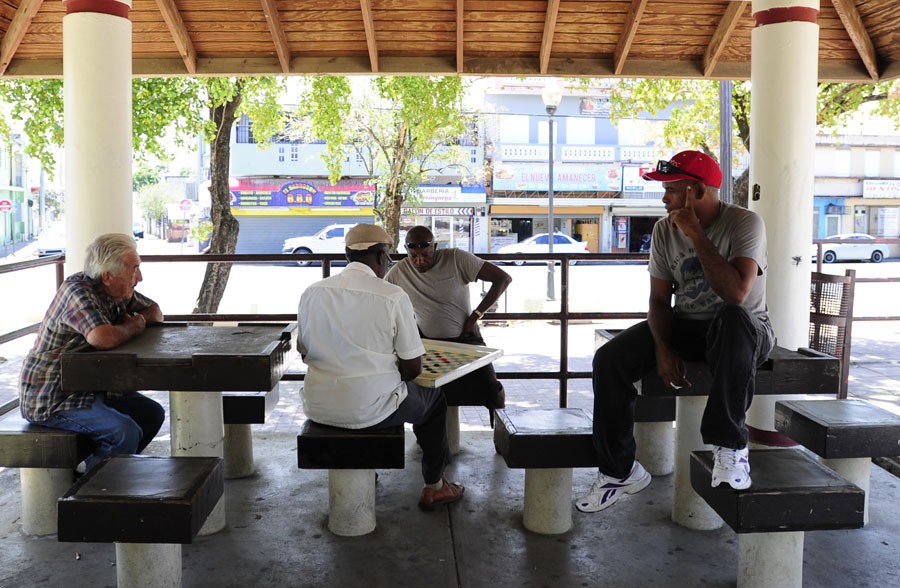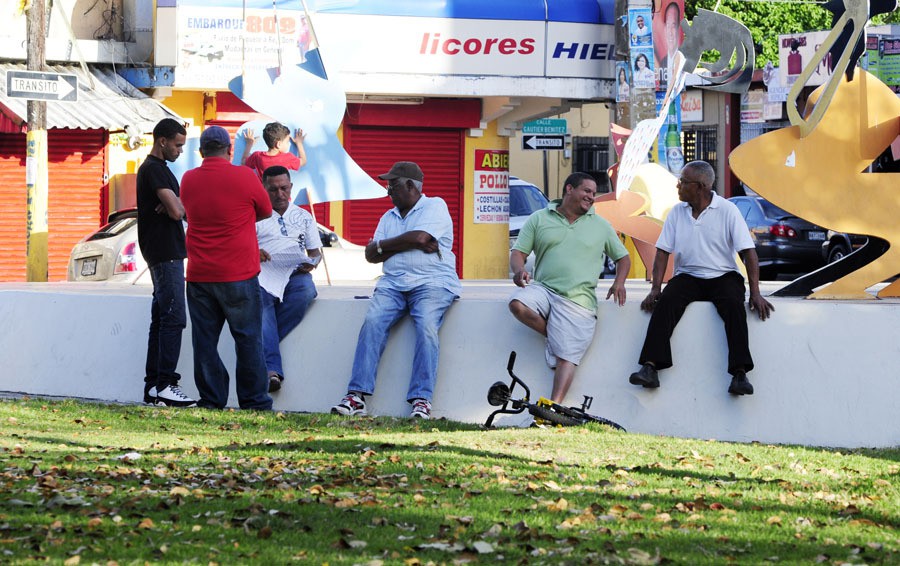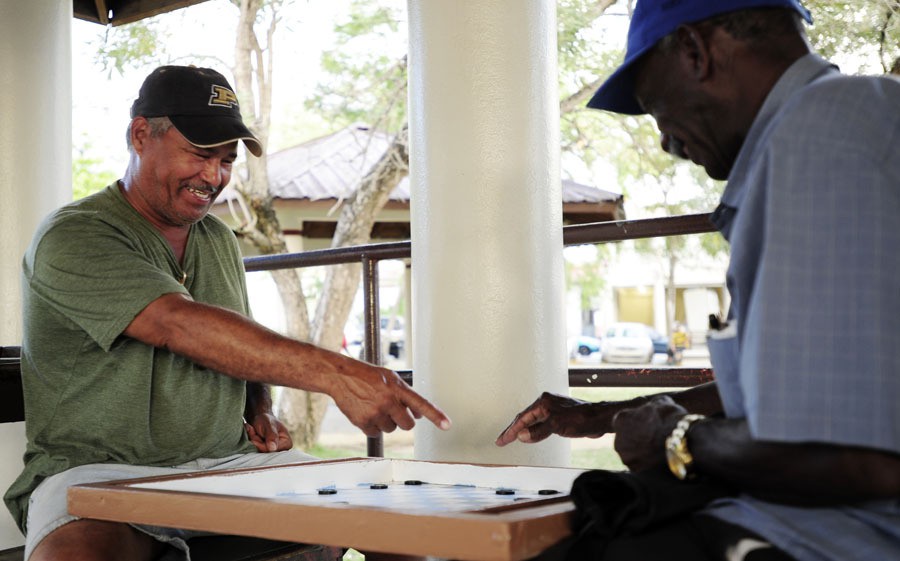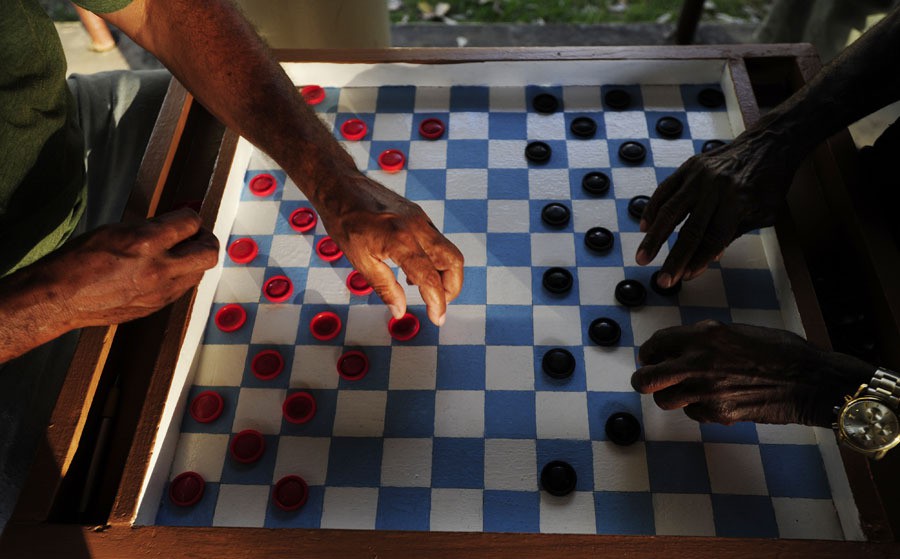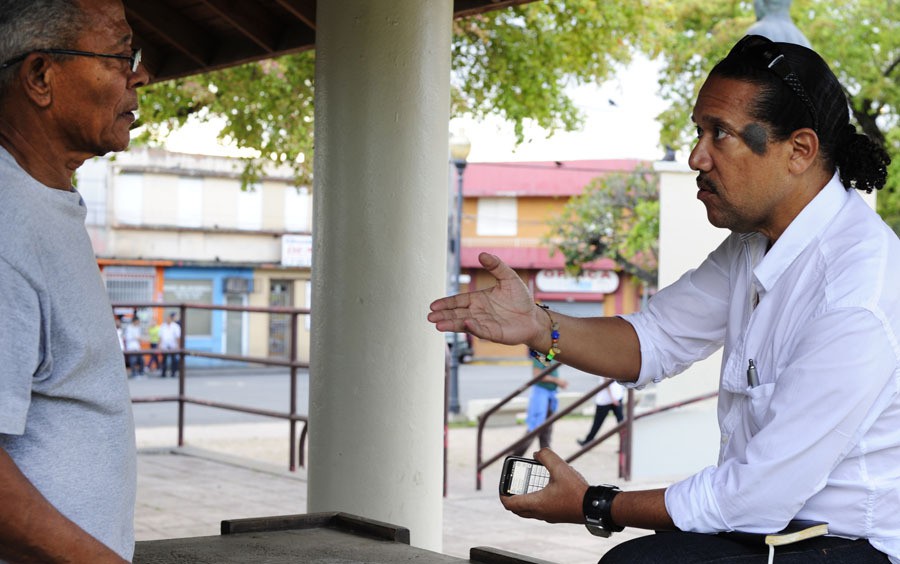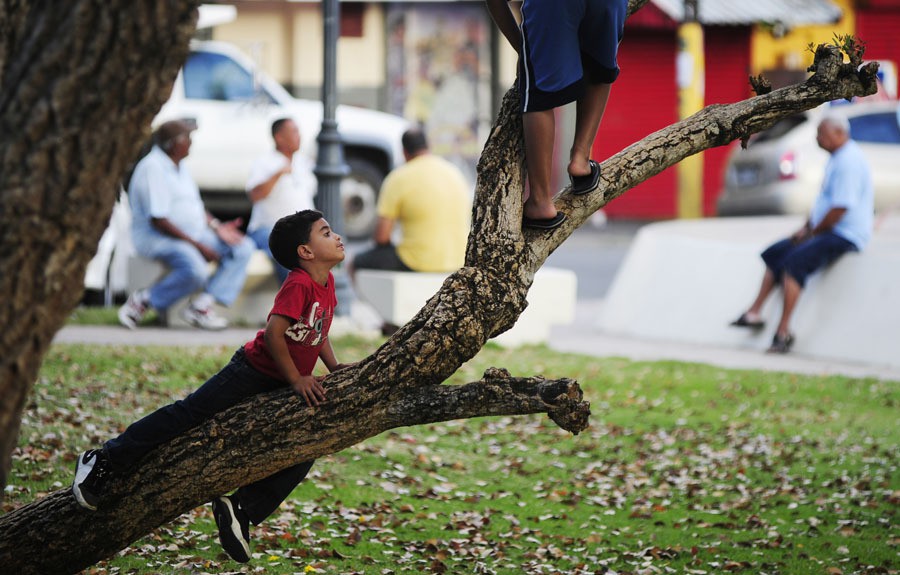Dominicans Dream of a Better Life From the Confines of a 'Worker Neighborhood' in Puerto Rico
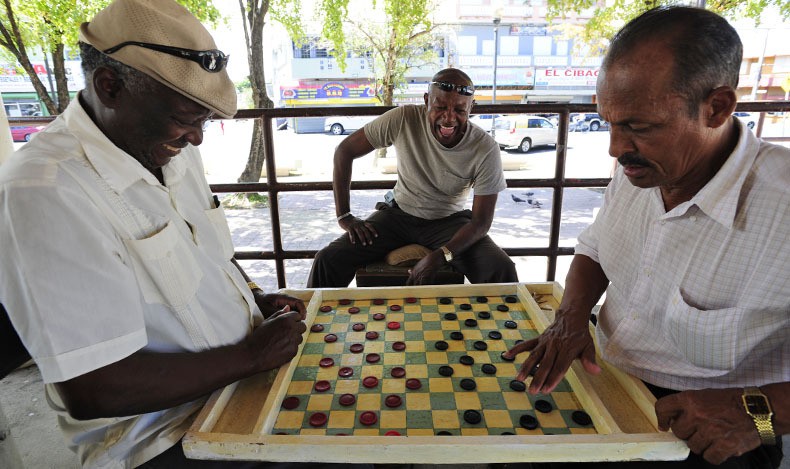
From left, Carmelo Vasguez, Nelson Jacobo Jimenez and Julian Albares play checkers within Plaza Barcelo in Barrio Obrero. Nestled in the middle of a heavily Dominican neighborhood in Santurce, Puerto Rico, community members often gather here to play checkers when work is unavailable. Photo by Brandon Quester |
By Weston Phippen
Cronkite Borderlands Initiative
SANTURCE, Puerto Rico -- She was gone fewer than five days from her home in the Dominican Republic and she had already been proposed to three times.
First, it was the captain of the boat that took the 34 immigrants nearly 90 miles across the ocean -- life in the Dominican had failed them so they came to Puerto Rico. Next it was the man waiting to take the immigrants to the city. He told her, "I saw you at the beach and I want you to be my wife." And then there was the man at the motel where she and a few other immigrants spent three days, waiting to be taken to find work. The motel owner told her to stay, that she wouldn't have to work so hard if she were with him.
But the beautiful Sandra Burgos left anyway. Soon she was in Barrio Obrero, Spanish for "worker neighborhood." She stepped off a bus down the street from a park called Plaza Barcelo and walked into a bar where a Dominican woman helped her find her first job. Burgos would clean houses. And one day, years later, she would have a home in the suburbs with a garden out front and a Dominican maid who shines the white-tile floors.
It was 27 years ago that Burgos arrived on the island. But Dominicans have not stopped coming to Barrio Obrero to find work and escape a minimum monthly salary that can be as low as $81 in their country. At the end of March, for example, the Coast Guard caught 18 people floating in a makeshift boat in the ocean on their way to Puerto Rico; it sent 13 home, five were kept for prosecution ostensibly because they had tried the journey before.
Puerto Rico is a U.S. territory, meaning that the people can't vote in presidential elections but are U.S. citizens and it uses the dollar. Many documented and undocumented Dominicans come to Obrero because relatives live here, which can help with housing, finding a job and adjusting to the new country. Officially, Dominicans make up nearly 20 percent of the population in Santurce, the two-by-five mile district Barrio Obrero is in, although that number is believed to be low because many Dominicans in the community are leery of strangers and believe that prying people – say, census workers – are government agents.
Out of Work in the Shadow of Wealth
Santurce's northwest side is Condado. It's a wealthy hotel district packed with fleshy, sunburned tourists. Condado sits next to Puerto Rico's capital, San Juan. But in the southeast of the district – where Barrio Obrero is – there are low-income housing units, narrow and unlabeled streets and the occasional stray horse that stops to drink from stagnant pools of water. Forty-six percent of the population in Santurce makes less than $15,000 each year; yet 7 percent makes more than $100,000. Their fancy houses and hotels, like glimmering sugar-white castles, are too far to see from the "worker neighborhood."
It takes fewer than five minutes to drive the barrio from end-to-end. What ties Obrero together is Plaza Barcelo, or the Placita, as the locals call it, the "small plaza." It's an acute triangle about 1½ football fields long. There's a playground and a small cement amphitheater where kids play baseball. Cars constantly park around the perimeter and vendors sell plantains and fruit from the backs of trucks. Small businesses ring the street, offering "hair cuts for all types," calling cards, money wires back to the Dominican Republic and liquor.
On a day in March there was a great sensation at the Placita: an iguana ran into the middle of the street. The men cheered when a tire barely missed it; they cheered when another tire hit it. Most of them have been out of steady work for a long time; they half-joked about barbequing it. They decided not to. The man they call "Chino" was sad to see the iguana killed.
Chino and the other men are the out-of-workers and the looking-for-workers. They gather under the shaded structures in the park from morning until the sun goes down, talking politics, religion and music. They look for work, and play dominoes, cards, and a lot of checkers to pass the time. Chino is 71; his real name is Arcadio Drullard. He said he gained residency in 1986 with the Immigration Reform and Control Act, which granted undocumented immigrants permanent residency if they'd been in the country since 1982 or if they had worked in agriculture in the past year. When asked why the others call him Chino, which means "Chinese," he took his glasses off and pointed to his eyes, then pulled the skin outward to dramatize it, smiling all the while. He left his wife and all but one child behind in the Dominican Republic. He has nine sons –"I've got a whole baseball team of sons" – and three daughters.
"In Santiago, 100 pesos is enough to eat for two days," Chino said. "Here you work for one day, get 100 dollars and you can eat for a week."
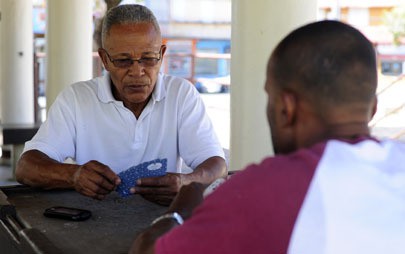
Arcadio 'Chino' Drullard, 71, plays cards with another Dominican Republic national in Plaza Barcelo, a small park in Barrio Obrero. Drullard now lives with his brother and one son after leaving his wife and 11 children behind in the Dominican Republic. Photo by Brandon Quester |
On this day Chino played cards with another man who wore steel-toed construction boots that were worn and frayed, with gashes in the leather along the toe, but that hadn't seen steady work for two months. "No high school, no working," the man with the boots said. "Even if you want to work at a store selling fried chicken – no high school, no working."
Chino comes to the park almost every day. He wakes with the sun – no need for an alarm, he said – eats bread with his coffee, then plays games in the shade with his friends. He comes here to call construction contractors for work and sometimes he finds it. But on this day the phone's main function was as a weight to keep the wind from scattering the deck of cards.
Mining, logging and construction jobs in Puerto Rico have been cut in half over the past five years, down from 68,000 in 2006 – according to the U.S. Bureau of Labor Statistics – many of those jobs were filled with the cheap, unskilled labor of Dominicans. The territory has an unemployment rate of more than 15 percent, almost double that of the mainland U.S. Still, Chino and many of the other men in the Placita believe that if the territory was independent of the U.S. it would fare about as well as the iguana did against the tire: no chance. No jobs, "… there would be nothing," Chino said.
'One Way or Another You're Going to Survive'
The main street running through Obrero – it runs in front of the Placita – is Avenida Borinquen, which is what the indigenous Tainos named the island. It means "the land of the brave Lord." Men stand outside of the multicolored shops along the Avenida, watching the cars pass, and boys in school uniforms jest and jockey with each other and follow groups of girls home. The music from store speakers purls out salsa, bachata and merengue. One of the streets that defines Obrero's border is called Calle Cortijo, named after Rafael Cortijo, a salsa composer and musician born in Santurce. The cemetery where Cortijo is buried is just a few blocks from the Placita and the man who takes care of the plots, who accepts beers through a hole in the fence, who paints the fading tombs, believes the most famous people in all of Puerto Rico are buried in this cemetery, in the worker neighborhood.
For $2,500 Funeraria Marcos Arocho in Obrero will send the deceased back to the Dominican Republic – they do about 10 to 15 a month – and when the cost is more than the family can handle, the community often pitches in to send the body home, finally to rest in their home country.
Down the street from the Placita and near the cemetery is a small shop that sells images of God and hope and affordable solutions. A short walk from a McDonalds that sits near the end of Barrio Obrero, it offers aerosol cans with love spray and a package deal that includes "Fast luck perfume with real rabbits foot." The woman who works the shop recommends that the men in the park pray to St. Expedite, the patron saint of urgent causes and prompt solutions.
"It's hard," Chino said. "That's life. And one way or another you're going to survive."
'If You're Dark You Have to Work Up Top'
God is with Chino – God has been with Chino for the past two years now. He was never much of a religious man, but about four years after he left his family in the Dominican Republic he said he started having a recurring dream. For 20 years he dreamed he walked the streets naked – now he has given his soul to Christ and the dreams have stopped. So in April, when Chino said he will leave Puerto Rico to work in Texas on the oil derricks, he will pray to God and God will look over him.
Chino said he has worked on oil derricks in St. Croix before, and that this will be the second time he has worked in Texas. He said he has a six-month contract in Port Arthur, Texas, which he got with the help of a man who lives near Obrero. He'll work five or six days a week, 50 to 60 hours a week. When the money starts coming in he'll send $600 home to his wife and family each month – remittances back to the Dominican Republic (not just from Puerto Rico) make up more than 10 percent of the country's Gross Domestic Product, according to the World Bank.
Puerto Rico, "The Island of Enchantment" – as the license plates point out – has lost the luster that drew Chino here from the Dominican Republic, so Chino will fly into Houston and pay $32 for a ride to Port Arthur, where he will stay in bunkhouses with all types of immigrants who work the oil fields.
"No gringos," he said. Then added, half-jokingly: "They work on the bottom. We have to go up top. If you're dark, you have to work up top."
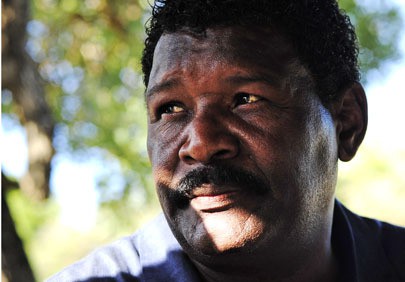
Deseado Larcen, 58, is a minister at the Pentecostal church in Barrio Obrero, a neighborhood in Sunturce, Puerto Rico. Larcen has been out of work for two years and refuses to take money for his ministerial services. Photo by Brandon Quester |
The 71-year-old Chino laughed when asked if he thinks he's too old for that type of work, then smiled and flexed his arms, forearms upward, and credited his virility to 32 years without drinking, smoking or eating red meat. God must watch Chino and keep him healthy enough to work for just four more years. Then he'll retire.
Chino's minister at the Pentecostal church in Obrero parked his faded black car and walked toward the checker players. A few days before, the minister spoke excitedly about the fight against evil and the inevitable triumph of Christ. But on this day he sat languidly down on a bench, placed his black leather Bible next to him, held his phone between his legs and stared at it, looking as if the battle of good and evil was pressing in, as if life was pressing in, and it brought trouble to a face that days before could only house a smile.
The minister, too, has been out of steady work – for two years now, he said – and has pawned most of his belongings. He said he won't take money for the work he does for the church and he refuses to take welfare, or "the bread" – as he called it. But today he didn't come to call or look for work. Today he will spread the Good Word.
As the minister's face wrestled its invisible burden, another man walked up to the square. Jose Rodriguez, dressed in a blue sport coat with gold buttons, oversized sunglasses with a "Gucci" label, his hair slicked back into a ponytail. He waved his black notebook around and lectured the men. The checker players responded all at once, like braying seals. Rodriguez is known as the unofficial spokesman of the community and fights for Dominican rights; these days police abuse consumes much of his time.
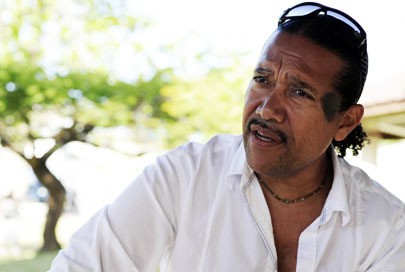
Jose Rodriguez, a spokesman for the Dominican Committee on Human Rights, in the neighborhood of Barrio Obrero in Santurce, Puerto Rico. Rodriguez is an outspoken community member here who is frustrated with alleged harassment by local police in this heavily Dominican neighborhood. Photo by Brandon Quester |
Rodriguez was working with several Dominicans at the time who said the police had abused them – even the minister complained that some police had wrongfully entered his house. Rodriguez has a rather black-and-white explanation for police abuse and discrimination: "They use their power to hurt people, to kill people. They don't care because you are Dominican. You're a piece of shit to them."
One of the cases Rodriguez is working on involves a man who died after falling or being pushed off a balcony – depending on whom you believe. The man was Franklin Caseres Ozorio. His wife was pregnant at the time and says that six months prior to his death Ozorio had a run in with the police just across the street from the Placita. It ended with him being badly beaten. The day he died, Ozorio was on a friend's roof helping with some work. A neighbor thought he could have been a thief and called the police, and with the last run-in having gone badly, Ozorio decided he would not come down off the roof. Ozorio's wife said the police then came up to the roof and Ozorio tried to flee. There was a struggle, and witnesses told her that Ozorio was first handcuffed, then pushed off a balcony, where he hit the ground and died. The police say he jumped.
Rodriguez said he has been talking with the FBI and to support his stance, he notes that the U.S. Department of Justice is investigating the Puerto Rican Police Department for constitutional violations. A Department of Justice Report on police corruption begins:
"Many hard working and dedicated PRPD [Puerto Rico Police Department] officers serve the public with distinction under often challenging conditions. Unfortunately, PRPD is broken in a number of critical and fundamental respects …"
The 2011 report lists: "Excessive force in violation of the Fourth Amendment; Unreasonable force and other misconduct designed to suppress the exercise of protected First Amendment rights." Then goes on to mention " … discriminatory policing practices that target individuals of Dominican descent …"
The FBI did not respond to phone inquiries on Ozorio's case.
Down the street from the Placita, past the McDonalds, is the Obrero police precinct where Sgt. Iran Sanchez was transferred one week before. Just off a night shift, he was very tired, underpaid, overworked, but very genial. Yes, of course there are problems, he said. He thought the report exaggerated the discrimination and the constitutional violations. On the other hand, "Right now, the vest I'm wearing is brand new, thanks to the report."
Sanchez said he sometimes has only two patrol cars for the entire Obrero district – the other day he had one. He pays to make blank copies of his own police report forms because the head office often won't send any out and the training office looks like a backwoods shack. Last week the toilet was broken and flooded the room. It still leaked a bit.
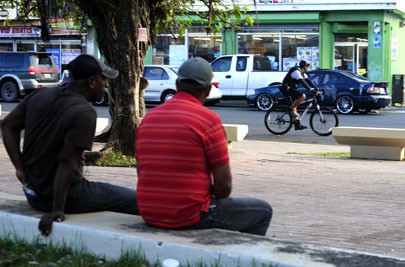
A police officer patrols on a bicycle on the streets surrounding a small plaza in Bario Obrero, in Santurce, Puerto Rico. The Plaza Barcelo, known by locals as the Placita, is a central point of this heavily Dominican community. Photo by Brandon Quester |
Sanchez said Puerto Ricans have little respect for officers and violent retaliation is always a possibility. They're berated by the press and the people and thanked for their work with a menial government check.
"If we want to change the world for the better," Sanchez said, "you cannot judge the whole by the one."
Puerto Rico's murder rate is nearly double the highest state in the U.S. – 22.5 per 100,000 persons in 2009, compared to Louisiana's 11.8 murders per 100,000 persons, according to the DOJ report.
Around 5 or 6 p.m. most of the people in the park will go home. It's not safe to be out after dark. Chino will eat some fish, study the Bible, maybe watch a baseball game – he likes the Boston Red Sox because he said there are a lot of Dominicans on the team. Chino lives alone in a three-bedroom house that he's preparing for his family. He's waited 25 years for them to come and he thinks it'll finally happen this summer.
Working Day-by-Day on an Immigrant Dream
The immigration aid office that's helping Chino's family get papers is across the street from the Placita. It's a small building painted the color of an Orange Dreamsicle with a statue of liberty on the top looking out over the Placita – "Because it's the symbol of the immigrant," said José Lora Gerónimo, one of the owners.
Lora is Dominican and fell in love with a Puerto Rican woman when he came to a conference at the Hilton. He was a chemical engineer specializing in milk production but he needed to get recertified in the field in order to work in Puerto Rico. He felt the school he studied at in the Dominican Republic was much better than those in Puerto Rico. He felt he was more qualified than many of his Puerto Rican counterparts; He refused to recertify on principle.
Lora said his office has helped 7,200 customers since it first opened 20 years ago. His clients march their families in when they finally arrive and he becomes a part of their family, telling them to go to school, work hard, to stay away from drugs.
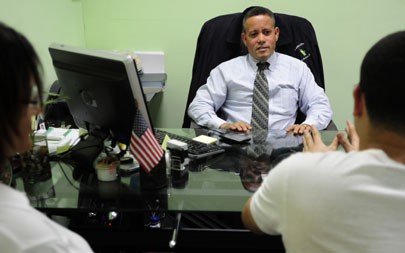
José Lora-Gerónimo, a consultant on immigration and residency applications, talks with community members in Barrio Obrero, a small community within Santurce, Puerto Rico. Jose offers his consultations free of charge. The building stands out in this central part of the neighborhood because of a miniature Statue of Liberty on the building's roof. Photo by Brandon Quester |
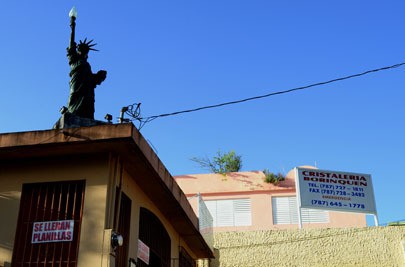
A miniature Statue of Liberty juts into the skyline in Barrio Obrero, a heavily Dominican neighborhood in Santurce, Puerto Rico. The building is owned by José Lora-Gerónimo, a consultant on immigration and residency applications. He offers consultations free of charge. Photo by Brandon Quester |
The process to get a family member residency is convoluted and each question Lora answers spawns several more until he smiles empathetically. A Dominican with U.S. citizenship, he said, has the right to bring over his kids and wife and his mother and father. When those family members come over and get residency, they can request their spouses and children but not the parents of the spouse on the other side, unless they can get citizenship. Each generation brings out another, and another, like new twists on products off the assembly line. "They beat Apple," Lora said.
There are government fees and a wait time of years. And the person bringing family members over has to be above the poverty line, which is around $19,000 a year, which for many might as well be a million because much of the work to be had is under-the-table. Chino had to save then get a sponsor above the poverty line to vouch for him, like a cosigner on a loan to whom Chino had to pay a service fee. Chino said the whole process cost him more than $20,000 for five people.
"You don't feel good outside your country," he said. "But for the well being of your family who are [home in the Dominican Republic], you have to leave to give them a better life."
So Chino passes time in the Placita until his family can join him. The men sit around with their cell phones, the traffic passing on Avenida Borinquen below, the men moving their checker pieces constantly, like skipping stones across water, stopping to laugh or argue about a move or to sit in repose, looking out over their little community.
Chino is confident his children will find work – they are hard workers, like him, he said. He hopes one day to move the whole family to Philadelphia, where he has a sister. But he'll bring his family here first, to Barrio Obrero, to be wrapped up by the arms of the immigrant community, hoping one day to get a little closer to those glimmering, sugar-white homes of the upper class.
And as hard as times are now, there's Sandra Burgos as proof. She made it.
Burgos, the woman who fielded so many marriage proposals decades before, can now see herself in the woman she hires to clean her home – the woman didn't want to give her name because she said the reporter is probably an immigration agent. The maid lives in Barrio Obrero, just like Burgos did. And she came to Puerto Rico on a boat, too. Burgos, who said she is now a citizen, speaks with her maid and tells her to take any job she can get, even if she works double shifts, to save money and one day she will be successful.
Each Sunday Burgos has her family over for dinner. Her son will soon finish school at the University of Puerto Rico and when he arrived he parked his new Toyota FJ Cruiser on the street, next to Burgos' white Jeep. The inside of her house is modern, with white tile, white-leather chairs, a wine rack with hanging glasses and turgid looking gold Buddhas placed on the top.
There are two pictures of Burgos hanging near the front door – all these years later and she's still beautiful. The Dominican maid, dragging a mop across the shiny, white tile surface, cleaned it all the day before.
Back to Top
